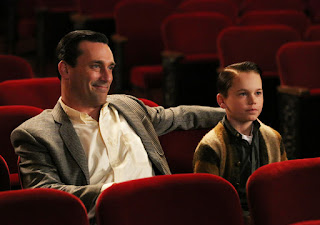 |
| Michael Yarish/AMC |
Any situation in which Peggy can be reunited with her former co-workers is always intriguing, so bringing everyone together for an advertising award ceremony was a smart choice by writers Tom Smuts and Matthew Weiner. Despite leaving the company a year ago, Megan is up for an award against Peggy and the fix is in from the start, as Peggy's boss Ted tells her that Megan will win this one, but that next year it's all Peggy. We later see that Megan indeed wins the award, but not before the tragic news interrupts the ceremony. Someone from the crowd shouts that Martin Luther King, Jr. has been assassinated, sending the entire room into a panicked frenzy. I wonder, however, if many of the horrified screams are due to a certain amount of social pressure. I'm not saying the characters aren't deeply saddened by the tragedy, but their feelings afterward seem to indicate an awareness of how little of an effect it will have on their lives. The changing winds of society make the characters perceptive of the fact that they should be doing something, either by taking action or simply being a little kinder. It is that this new wave of equality is in fact new, however, that demonstrates their unsureness.
It's interesting seeing the reactions of certain characters. Pete lashes out at Harry in front of the whole office, telling him that this is "a shameful, shameful day," showing the rare, progressive side he has tried to suppress through trying to fit in with his more conservative colleagues. It also gives him the appropriate soapbox to show how "down with the struggle" he is, establishing his youthfulness for the first time in a while. The show's two most socially progressive women, Peggy and Joan, find it best to express their empathy through knowing hugs with their black secretaries. They are both at varying degrees of awkwardness, but it is in the aftermath of Joan's hug with Dawn that particularly highlights the white characters' inability to try understand the repercussions of the assassination. Don tries to send Dawn home, despite her protests about having to commute such a long way from home. Don doesn't understand the extent of her struggle and neither do his colleagues. Despite the new era of peace and understanding, they are still in completely different worlds, if not more so at this point.
Even worse than these awkward attempts at sympathizing are the amount of characters that try to profit off of the tragedy. Insurance agent Randall (played to creepy delight by Lost's William Mapother) tries to pitch his idea of advertising his company on the bottom of Molotov cocktails throw in the street. It's sad how often these types of companies attempt to maximize their profits in the wake of a national tragedy (and they still do today) but it's not always at the grand level. Henry Francis goes to help on the streets of Harlem, not because he's truly concerned but for his own political self-interest. The real estate agent trying to sell Peggy an apartment excitedly tells her that the price has gone down, given the level of violence on the streets.
In the midst of all of this, Betty is too overwhelmed and tells Don to take the kids. Bobby pretends to be sick so he doesn't have to go to school and in true Don fashion, he takes Bobby out to an afternoon movie. And what better movie to see on such an apocalyptic day than Planet of the Apes? The end of the film directly parallels the destruction going on in the streets of New York, so both Don and Bobby are transfixed by its message. It even persuades Bobby to tell a black theater attendant that "everybody likes to go to the movies when they're sad." It is a rare moment of insight from one of the show's youngest characters and his statement is truthful. For people like Don, envisioning another life, another story is exactly what they need. They need to escape the realities of their past (and present), and movies are an excellent example of how they cope.** Don is noticeably proud of his young son's insight in a way that's slightly troubling. Don is looking at the second half of his life, so his overall attitude is inherently negative but his 10-year-old son shouldn't be waxing philosophical at his age. I know these are troubling times for a kid to grow up in, but like his sister, Sally, he is growing up too fast and I worry about the repercussions of his rather terrible childhood.
**This is particularly ironic given the realism of Mad Men itself.
Many critics and fans have voiced their concern with this season, citing the fact that nothing exciting has happened, the writers are going over previously treaded ground, and, of course, "NOT ENOUGH JOAN!!!" Personally, I think there is a certain emptiness to this season but I also think it's intentional. Our main characters are trying to fill their own voids with empty platitudes and forced emotion, and discovering how empty they still feel. This is why Don looking over the city at the end of the episode is the perfect capper. Millions of people walk through New York's streets every day and he can't manage to genuinely and honestly open himself up to a single one. He knows the flood is coming. Perhaps he's known for a while. But he still doesn't have his one true partner to take on the ark with him.
Grade: A-
MVP: The whole cast. Excellent ensemble piece.

No comments:
Post a Comment